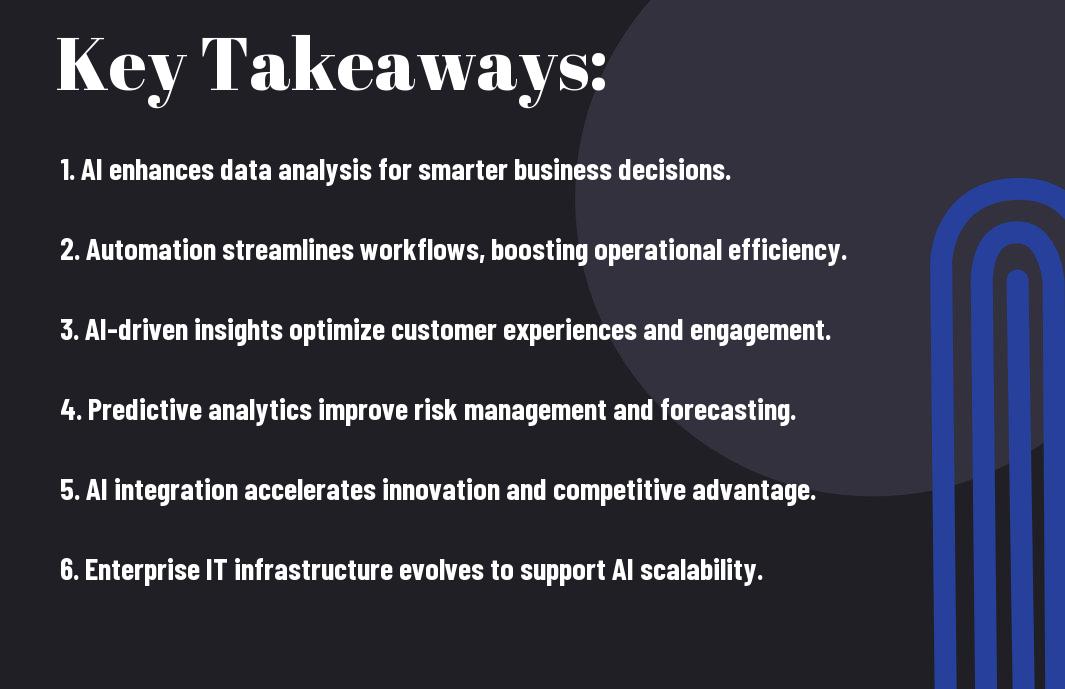With rapid advancements in artificial intelligence, your approach to enterprise technology is undergoing a significant transformation. You’ll discover how AI-driven tools are streamlining operations, enhancing decision-making, and fostering innovation across various sectors. However, these changes also bring security challenges and ethical considerations that you must navigate. Understanding these dynamics will empower you to leverage AI effectively, ensuring that your organization not only survives but thrives in an increasingly competitive landscape.
The Power Shift: How AI is Redefining Decision-Making
AI is transforming decision-making processes, empowering leaders to harness data with unprecedented efficiency. As traditional approaches become outdated, organizations that integrate AI can swiftly analyze vast datasets, uncover trends, and make informed choices. This shift is not just about automation; it’s about enhancing your team’s ability to navigate complex environments. Executives who leverage AI-driven insights can pivot strategies in real-time, ensuring their organizations remain resilient and competitive.
Data-Driven Insights: Transforming Business Intelligence
Integrating AI into business intelligence allows you to derive actionable insights from your data pools, eliminating guesswork. By employing machine learning algorithms, you can quickly identify patterns, optimize operations, and enhance customer experiences. For instance, tools like Tableau and Power BI harness AI capabilities to deliver interactive visuals, making your analytics more intuitive and accessible than ever.
Predictive Analytics: Foreseeing Opportunities and Risks
Predictive analytics enables you to anticipate future trends and behaviors by analyzing historical data. With AI-powered models, you can uncover hidden correlations that forecast sales spikes or potential risks. This foresight equips your organization to strategize effectively, ensuring long-term success and stability.
By utilizing predictive analytics, your business can not only forecast market trends but also mitigate potential disruptions. For example, companies in retail leverage AI to analyze purchasing behavior and adjust inventory levels accordingly, preventing stockouts or overstock situations. In finance, institutions deploy predictive models to assess credit risks with higher accuracy, safeguarding their investments. Ultimately, embracing predictive analytics empowers you to proactively address challenges and seize opportunities before they arise, giving your organization a significant competitive edge.

Automation’s New Frontier: Streamlining Operations with AI
As enterprises embrace AI, automation emerges as a transformative force that streamlines operations and reduces manual tasks. By integrating AI into workflows, organizations can expect to enhance speed and accuracy, allowing teams to focus on higher-value projects. Companies leveraging AI-driven automation often report up to a 40% increase in operational efficiency, which not only accelerates processes but also significantly contributes to improved service delivery and customer satisfaction.
Workflow Optimization: Enhancing Efficiency and Productivity
Optimizing workflows through AI enables you to identify bottlenecks in processes and implement real-time adjustments. By leveraging predictive analytics, AI tools analyze operational data to streamline tasks, ensuring that every step is necessary and executed at peak efficiency. This enhanced productivity often leads to better resource allocation and a measurable increase in overall output.
Resource Management: Cutting Costs through AI Solutions
AI-driven resource management systems are reshaping how businesses operate by cutting costs and maximizing utilization. These solutions analyze historical usage data to forecast future needs, enabling a 15-30% reduction in operational costs by eliminating waste and improving inventory management. This approach allows organizations to maintain optimal stock levels while avoiding excess, enhancing profitability.
For example, a leading retailer adopted AI for resource management and reported a significant drop in inventory carrying costs after implementing predictive analytics. By understanding purchasing trends in real-time, they could adjust stock levels accordingly, preventing overstock situations and ensuring that popular items were always available. Such proactive management not only reduces costs but also fuels business scalability, allowing you to devote resources to innovation and growth, rather than constant operational adjustments.

Personalization at Scale: Revolutionizing Customer Experience
The advent of AI allows enterprises to offer personalized experiences at an unprecedented scale. By analyzing large datasets, AI systems can make sense of individual customer behaviors, preferences, and purchasing patterns, transforming mundane interactions into tailored experiences that resonate with your audience. This leap in technology is reshaping business models and demanding an agile response from brands eager to enhance customer loyalty. For deeper insights on this shift, explore The AI Revolution: Reshaping the Enterprise Landscape.
Tailored Marketing Strategies: Engaging Customers on a Personal Level
AI-driven insights enable you to create tailored marketing strategies that engage customers on a personal level. By segmenting your audience and analyzing data, AI allows you to craft messaging that speaks directly to each individual’s preferences and behaviors. This targeted approach not only improves engagement rates but also boosts conversion and retention, ultimately leading to a stronger return on investment.
Customer Support Transformation: AI-Powered Solutions
AI-powered solutions are transforming the way you approach customer support. Chatbots, for instance, can provide instant answers to frequently asked questions, streamlining support interactions and allowing your team to focus on more complex issues. By harnessing natural language processing and machine learning, these tools learn from interactions, continuously improving their responses and understanding of customer needs.
The evolution of customer support through AI is marked by increasing efficiency and enhanced service quality. AI chatbots can handle thousands of inquiries simultaneously, enabling your business to reduce wait times dramatically. Companies like Zendesk report that integrating AI can lead to a 40% reduction in support costs, allowing for more resources to be allocated elsewhere. Additionally, AI analytics can highlight customer pain points, enabling you to proactively address issues before they escalate, thus fostering a more positive customer experience overall.
Ethical Dimensions: Navigating Challenges in AI Implementation
Implementing AI technologies in enterprises involves navigating a complex landscape of ethical challenges. While AI offers remarkable potential for innovation, companies must consider the broader implications of their decisions. Balancing technological advancement with ethical responsibility requires a keen understanding of the potential risks to society, the workforce, and individual privacy. Decisions made today can have lasting consequences, and organizations must be proactive in addressing these challenges as they build their AI strategies.
Data Privacy Concerns: Balancing Innovation with Trust
Data privacy remains a prominent concern for enterprises leveraging AI. As you seek to innovate, you’ll also need to foster trust among your customers and stakeholders by implementing stringent data protection measures. Without a strong commitment to upholding privacy regulations, companies risk not only legal ramifications but also damage to their reputations. Ensuring transparency in how data is collected, stored, and utilized is necessary for maintaining the integrity of your AI initiatives.
Bias and Fairness: Ensuring Equitable AI Practices
Bias in AI systems can lead to significant real-world consequences, disproportionately affecting marginalized communities. As you develop and implement AI technologies, actively seek methodologies that promote fairness and equality. Utilizing diverse datasets and continuously monitoring outcomes are effective strategies to minimize bias and ensure AI practices are equitable. Creating an environment where diverse perspectives are valued during the development phase plays a vital role in producing algorithms that reflect fairness in their outcomes.
Equitable AI practices demand a rigorous approach to identify and mitigate potential biases at various stages of the data lifecycle. For instance, incorporating diverse teams in the design process can provide insights that reduce bias in the training data. A study by MIT Media Lab found that facial-recognition algorithms misidentified darker-skinned individuals at rates up to 34% compared to their lighter counterparts. By conducting thorough audits and engaging with communities affected by AI applications, organizations can make informed adjustments and pursue a more just technological landscape. Ultimately, prioritizing fairness can not only enhance the ethical standards of your AI applications but also foster customer loyalty and societal advancement.
Future-Proofing Enterprises: Preparing for an AI-Dominant Landscape
Enterprises face the challenge of ensuring their strategies are adaptable to the impending AI-dominant landscape. Preparing for this transformation involves both capitalizing on existing technologies and staying ahead of emerging ones. By embracing a growth mindset and fostering a culture of continuous innovation, you can mitigate risks and seize opportunities associated with artificial intelligence. To understand how AI is reshaping the Innovation Landscape Across Industries: How AI is …, companies should actively invest in research and development initiatives.
Skills Development: Reskilling the Workforce for Tomorrow
Preparing your workforce for an AI-centric future requires targeted reskilling initiatives that focus on emerging technologies and data literacy. Providing employees with the necessary training empowers them to harness AI tools effectively, enhancing productivity and innovation. As automation increases, ensuring your team is adept at leveraging these technologies will be vital to maintaining a competitive edge.
Integration Strategies: Merging Legacy Systems with AI Technologies
Efficient integration of legacy systems with modern AI technologies often poses significant challenges. First, evaluating your existing infrastructure is imperative for determining which systems can be upgraded and which may need complete overhauls. By employing Application Programming Interfaces (APIs) and microservices, you can facilitate communication between old and new systems, preserving valuable data while enhancing functionality. Success stories in this area include companies that utilized AI to streamline operations without sacrificing the reliability of legacy frameworks.
For instance, consider a retail organization that retained its well-established inventory management system while integrating AI-driven analytics for demand forecasting. This hybrid approach ensured that they could leverage historical data for insights while simultaneously adopting new, innovative technologies. By focusing on creating seamless connections between existing systems and AI tools, you can future-proof your enterprise and enhance operational efficacy.
Summing up
Ultimately, your understanding of how AI development is reshaping enterprise technology landscapes can empower you to leverage these advancements for competitive advantage. By embracing AI-driven solutions, you can streamline operations, enhance decision-making, and foster innovation within your organization. As you navigate this evolving landscape, staying informed about AI trends and their applications will enable you to make strategic choices that align with your business goals, ultimately transforming your enterprise for the better.











